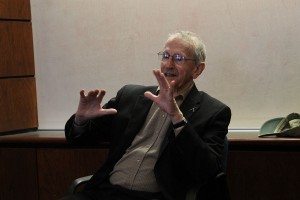U.S. Poet Laureate Philip Levine – A lifetime of giving a thundering voice to the voiceless
|
EL PASO – Poet Laureate Philip Levine, still as fit and funny at age 85 as he was as a young man working the night shift at a car factory, shared his special brand of earthy, poignant and insightful poetry – and a sizable measure of good humored repartee – with over 1000 fans at UTEP recently. The poet of the working class, who was born in Detroit to poor Russian Jewish immigrant parents, began writing professionally in the early 1950’s and has been giving “a voice to the voiceless” ever since. His message and poetry resonated with his El Paso audience in a city that is predominately Hispanic and working class. Asked by Sociologist Gina Nuñez what he thinks of the billions spent by the U.S. government erecting walls along the 2000-mile border, Levine responded: “The worst walls are the ones we can’t see because we are erecting interior walls. You say they’re dividing families.
